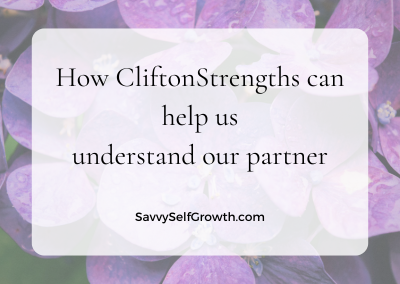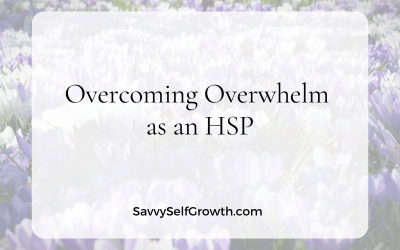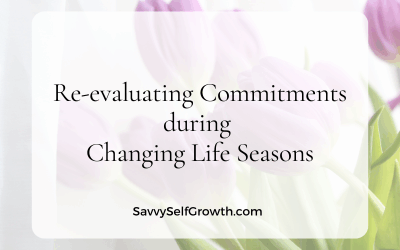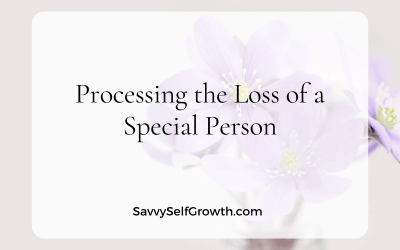In this article, I explore how knowing our CliftonStrengths has personally helped my husband and me in our relationship.
It’s a funny old thing how our close relationships work.
If we’re honest, mostly we love that person — and other times it’s closer to eyerolls, annoyance, exasperation or even murder, lol.
Can you identify?
In my almost 17-year marriage to my adorable husband and partner, conversations like the below are common:
Me: “That was when I was working at Business Edge and in a relationship with Rudie.”
Him: “Why do you talk about the past so often??” (frowning)
Me: “A lot? What do you mean?? It’s not a lot. I have categories in my brain for what period in my life I’m talking about.”
Or…
Me: “Could you stop changing the plans? I can’t stand it! I’ve just adjusted to your previous idea, now you want to change that already?!”
Him: “Wait! I’m just throwing out ideas, that’s all. It’s not a fixed thing we have to follow now. Another option is, we could do this and this and then that.”
Me: [eyeroll]. “There you go again. You just changed the plans again!”
Him: “No, I did not. I said these are JUST ideas for now. I’m in the idea phase!!”
And another one:
I share a tidbit with him about something I read somewhere.
He throws out twenty questions immediately. It feels like I need to me prove my points, and I simply don’t have all the answers. I feel incompetent, frustrated, and angry because he doesn’t believe me. And exhausted.
By the way, I cleared up with him that I’m writing about it, so it’s not a surprise for him when he reads this. He hates surprises, while I love them! <grin>
So how is it that relationships can survive with all this going on?
All of the above examples could have caused us to conclude that we are not compatible after all. Instead, I feel blessed and grateful that through my work with CliftonStrengths, I understand what’s happening behind the scenes.
Andrew and I each have many strengths that work in completely different ways. Of course, we’ll encounter areas of seeming ‘incompatibility’ because our strengths think, feel and behave in almost opposite ways. That does not make the relationship unable to work.
Knowing our strengths is priceless to understanding where the other person is coming from. It helps calm down rising frustration and irritation on both sides of this precious relationship.
So let me clarify further the above examples:
The ‘Why are you talking about the past’ example:
The talent called ‘Context’ is high up the list for me. That means I value placing things ‘in context’ (like in which relationship I was in, when a particular thing occurred.) I find it easy and enjoyable to look back, so I can understand how to handle ‘now’. I love thinking about good memories, and I have a super memory for small details.
While for Andrew, Context is way down the bottom of his list of talents. It’s draining for him to think of the past. The gravest mistake I can make is to ask him at 7 pm how his day was. I thought it was a caring thing to do — but for him, it’s tiring and I saw his eyes glaze over many times before I understood this about him. I felt hurt then — not anymore.
On top of that, his Futuristic talent is in his Top Strengths. So he loves thinking about the future, and planning it, and focusing on creating a wonderful tomorrow. While for me, oh boy… it’s way down theeeere on my list. I find it hard to ‘envision a lovely new tomorrow’. Very hard.
The ‘Can you stop changing plans’ example:
He has the talent of ‘Ideation’ and ‘Strategic Thinking’ in his Top 10. That means he has loads of ideas all coming up instantly. Plus, he sees all the possible options to get from Point A to Point B. And, he has no problem changing direction quickly — Strategic Thinking changes on a dime, and loves it. He loves the freedom of that.
My Ideation and Strategic Thinking are much lower on my list. I have a higher need for stability and once I’ve decided something, it’s harder for me to change direction.
Once I knew this about him, it made it easier for me to understand he’s not trying to frustrate or make me anxious on purpose. Why would he? It’s simply his talents at work. We cannot switch off our talents.
The ‘Twenty Questions fired at me’ example:
Andrew has the talent of Analytical, and that’s much further down my list of talents. He wants facts, data and proof. He understands the world through numbers, and the way he gets there is to ask probing questions to get to the absolute bottom-line truth about a topic.
Me? That makes me feel ‘under fire’. My brain freezes, I shut off and feel attacked — even though I know that’s not even remotely his intention. Plus, I have the talent of Connectedness — which is more about trusting my gut and connecting the dots. I don’t need proof for many things. (For some things, yes I do). Most often — if something makes intuitive sense to me, I simply couldn’t care about the research or the science.
How to foster mutual understanding in relationships
For harmony and relationships that work, it’s vital to understand each other’s map of the world.
Our partner’s thoughts and feelings are often hidden — the only thing we ‘see’ on the surface is their behaviour. Our own behaviour is driven by internal motivators that we, ourselves, are often not aware of. How then can we expect anyone else to understand what drives us? And vice versa.
That’s what I’ve found so valuable in the CliftonStrengths work
It gives us a way to become more aware of, and understand our own thinking, feeling and behaving. It gives us names for the things we do on automatic pilot without even realising we do that thing. We might think it’s normal, but for someone else, it might not be.
Strengths help us understand our partner’s thinking, feeling, and behaving patterns, too. It helps us know they’re not out to frustrate us or to be mean on purpose. They’re simply functioning from their default talents… just like we are.
Other examples of CliftonStrengths leading to understanding:
I’ve recently spoken to someone who is feeling very excited that she finally has language to use when she talks to her husband about certain patterns. She hates competition, while he thrives under competitive circumstances. It’s his strength, her weakness. But now they can discuss it with equanimity and curiosity.
Another person has finally started understanding aspects of her husband. He absolutely has to talk, and starts conversations at inappropriate times when it’s going to make her late. He processes every thought verbally (the talent of Communication), while she’s more of an internal processor (the talent of Intellection).
In another example, a colleague shared how deeply useful it was that she and her business partner knew each other’s strengths. At one point, a very difficult situation arose that had the potential to cause a split in the relationship. However, they could save it and build a deeper trust relationship because they understood each other’s strengths and weaknesses. I am planning to interview them since it is a beautiful story of healing for them both, and their business.
Judgments in relationships
We can judge others’ talents all we want (and make no mistake, we do!), but that won’t make the other person change, and it won’t help us to understand them either. In fact, when we feel judged, we feel like we have to defend our point of view. Well, they do too!
For instance, thinking thoughts like the below, when that might be their strength, will likely lead to more disharmony and even deeper problems.
- there should be no competition, only cooperation (that’s a death knell for a person with high Competition)
- you talk too much, why can’t you think before you speak? (a person high in Communication has no other way — they process as they speak)
- if you decide something, you should stick to it (that drives my husband around the bend!)
There’s some ‘nature and nurture’ involved in talent development. We don’t choose our talents, just like our partners didn’t choose theirs. Talents develop over time, and get stronger and stronger as those neural networks are used and practiced over and over.
Five Strengths Tips
If you’re having a hard time understanding a partner (business or personal), here are a few tips:
One:
A wonderful place to start is with self-awareness through a journey of getting to know your own talents and Strengths. Then, as you start seeing your own in action, it’ll start making sense to you how your partner has talents that are different from yours.
Our talents can’t help functioning all the time. They’re switched on, whether we (or our significant others) like it or not. And vice versa!
Two:
Knowing our strengths gives us names and language to know ourselves and our partners. It can create wholesome levels of mutual respect that might not be otherwise possible.
Three:
Do the CliftonStrengths Assessment here. Top 5 is a great start, and if you can afford it, go for the Full 34. But please, please don’t stop there. Many people read the report and don’t recognize the descriptions in themselves. They put the report away, never to be thought of again. That’s such a shame, and won’t shift the needle.
Four:
Reach out to me, or another Cliftonstrengths expert, to help you understand what the report is really saying. We’ll talk through it in much detail, and support you to see examples in your own life. “A discussion (or debrief) brings it to life and makes it real”, is what I’ve heard from so many.
Five:
Only then, once you understand how strong your own patterns are, would I suggest you encourage your partner to do theirs. And never with the intention to be able to say “See, I told you you’re weak in xyz”. Instead, suggest it with curiosity and openness about what makes them tick the way they do… For mutual understanding and finding a common language to talk about their (and our map) of the world. (I grin here, because Harmony is one of my strengths and it loves to create win-win situations! You see, I can’t escape my strengths even in my writing. And neither can you. It helps to know clearly what they are!)
I wish you relationships with mutual understanding and respect for your differences.




